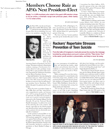If a person possesses a very common variant of a serotonin transporter gene and encounters stressful events, he or she may well develop symptoms of anxiety or depression, research findings have suggested.
The gene variant and stressful events may conspire to spark anxiety or depression by supercharging a brain region crucial for fear responses—the amygdala.
The study was conducted by Daniel Weinberger, M.D., director of the genes, cognition, and psychosis program at the National Institute of Mental Health, and by other scientists participating in the program. Results appeared in the February Archives of General Psychiatry.
The 5-HT transporter protein plays a vital role in nerve transmission involving the neurotransmitter serotonin. The gene that makes the transporter has two variants—a short one and a long one. Persons possessing either one or two copies of the short variant are more prone to anxiety and depression, at least in the wake of stressful events, than are persons possessing two copies of the long variant.
Thus Weinberger and his coworkers decided to conduct a study to determine whether the means by which stressful events lead to anxiety and depression in persons with one or two copies of the short gene variant is via activation of the amygdala, since that brain area is crucial for fear responses and other emotional reactions.
Their study included 92 subjects of the same ethnic background (European American) who did not have a psychiatric disorder to eliminate the possibility that ethnicity might confound results. All of the subjects were screened to see which of the two 5-HT transporter gene variants they possessed. Twenty-seven (29 percent) had two copies of the long variant, and 65 (71 percent) had at least one copy of the short variant. These percentages corresponded to those usually found in Americans of European backgrounds.
All of the subjects were asked to engage in a simple perceptual task known to robustly engage the amygdala. It involved matching fearful and angry facial expressions.
While the subjects undertook the task, Weinberger and his team visualized, with functional MRI scans, the activity of their left and right amygdalae. The researchers then looked to see whether there was any difference in amygdala activity between the subjects with the short gene variant and those with the long gene variant.
They found that subjects with one or more copies of the short gene variant experienced significantly more activity in the right amygdala than did subjects with the long gene variant. (In contrast, there was no difference in left amygdala activity between the two groups.)
Thus, “Our results reveal a potent modulatory effect of the [short gene variant] on amygdala reactivity to environmental threat,” the researchers concluded. “[The short gene variant] may represent a classic susceptibility factor for affective disorders by biasing the functional reactivity of the human amygdala in the context of stressful life experiences.”
On the other hand, since both men and women with the short gene variant were found to experience heightened right amygdala activity, possession of the short gene variant alone cannot explain women's greater susceptibility to anxiety and depression, the researchers noted.
Arch Gen Psychiatry 2005 2 146
